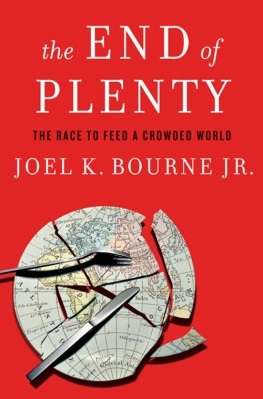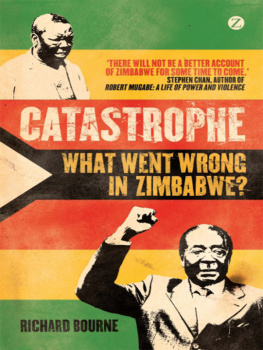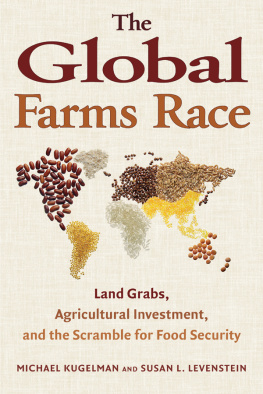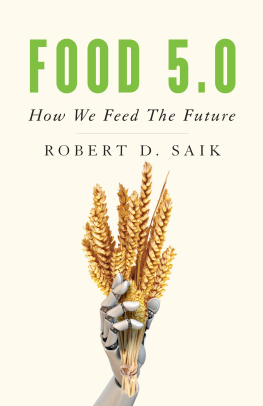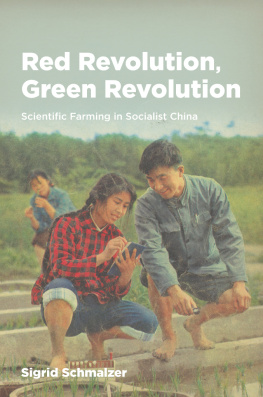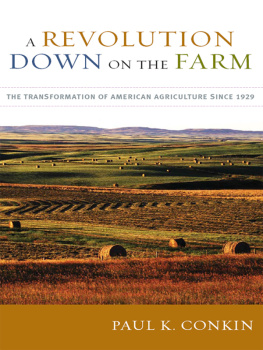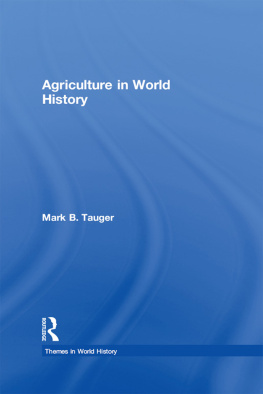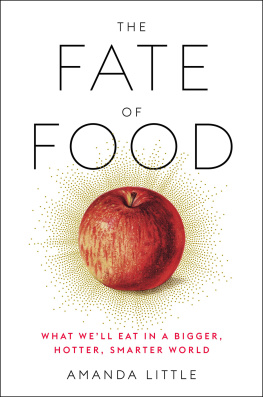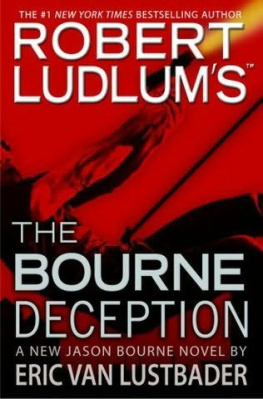
Copyright 2015 by Joel K. Bourne Jr.
All rights reserved
First Edition
For information about permission to reproduce selections from this book,
write to Permissions, W. W. Norton & Company, Inc.,
500 Fifth Avenue, New York, NY 10110
For information about special discounts for bulk purchases, please contact
W. W. Norton Special Sales at specialsales@wwnorton.com or 800-233-4830
Book design by Chris Welch
Production manager: Louise Mattarelliano
ISBN 978-0-393-07953-1
ISBN 978-0-393-24804-3 (e-book)
W. W. Norton & Company, Inc. 500 Fifth Avenue, New York, N.Y. 10110
www.wwnorton.com
W. W. Norton & Company Ltd., Castle House, 75/76 Wells Street, London W1T 3QT
THE END OF
PLENTY
THE RACE TO FEED A
CROWDED WORLD
Joel K. Bourne Jr.

W. W. Norton & Company
New York London
For my mother, who taught me to love language.
For my father, who taught me to love the land.
And for all those who toil each day to feed the world.
PART I

Egyptians mob a kiosk selling government-subsidized bread near the Great Pyramid of Giza as food prices soar in 2008.
The superior power of population is repressed, and the actual population kept equal to the means of subsistence, by misery and vice.Thomas Robert Malthus, 1798
T he quest to feed a growing population is as fundamental to the human condition as breathing or walking upright. Homo sapiens migrated out of Africa after a population explosion that began 70,000 years ago, likely hunting for new sources of food. After the first farmers domesticated plants in Mesopotamia, humans as a species took off. Even rudimentary agriculture could feed 50 times more people than most types of foraging, allowing for larger communities, the leisure to make art or war, and increasing innovation and trade.
Population growth and agricultural production have been locked in a never-ending tango ever since. For the first 4 million years of human existence, our population grew and fell in relation to our food supplies with roughly the same S-curve shown by almost every other species, from bacteria to blue whales. Only after we began farming did our curves start to radically diverge from those of our fellow species. Every agricultural advancethe domestication of plants, the domestication of livestock, irrigation, wet-rice cultivation, the use of legumes in crop rotationshas led to an increase in population, if not an outright explosion. When populations outgrew their ability to feed themselves, hunger exacted its toll until a new food source was found, technology improved, new lands were conquered, or the number of mouths to feed declined.
Numerous early scholars noted the relationship between population growth and available food supplies, including Confucius, Plato, and the author of Ecclesiastes. The latter wrote, some 2,500 years ago, When goods increase, they are increased who eat them. Even the great classical economist Adam Smith observed in Wealth of Nations (1776) that every species of animals naturally multiplies in proportion to the means of their subsistence, and no species can ever multiply beyond it.
The relationship between our numbers and our food resources is so ingrained in our evolution that its probably etched in our genetic code. Birth rates typically plunge during famines, whether they occur in Bangladesh, Ethiopia, or Ireland. An estimated 315,000 births were averted during the Irish Potato Famine. But it wasnt until the very end of the eighteenth century that a young British scholar attempted to describe exactly how that relationship worked. For his troubles, Reverend Thomas Robert Malthus became the father of modern demographythe study of populationsand one of the most hated scientists in history.
On an autumn day raw enough to color the cheeks of the ruddiest Englishman, I hopped on the London tube to visit the British Library at St. Pancras and see for myself the book that scholars have been arguing over for nearly two centuries. The librarian in the rare-book collection handed over a thin volume covered with small blobs rimmed by red and blue membranes, looking for all the world like cells dividing. The blurred letters on the cracked red leather spine read simply, Essay on Population, a truncation of the unwieldy title An Essay on the Principle of Population as It Affects the Future Improvement of Society, with Remarks on the Speculations of Mr. Godwin, M. Condorcet, and Other Writers. The author was anonymous, and it was dated June 7, 1798. The meat of the argument appears in the first chapter:
I think I may fairly make two postulates. First, that food is necessary to the existence of man. Secondly, that the passion between the sexes is necessary, and will remain nearly in its present state...
Population, when unchecked, increases in a geometrical ratio. Subsistence increases in an arithmetical ratio. A slight acquaintance with numbers will show the immensity of the first power in comparison of the second. By that law of our nature which makes food necessary to the life of man, the effects of these two unequal powers must be kept equal. This implies a strong and constantly operating check on population from the difficulty of subsistence. This difficulty must fall somewhere; and must necessarily be severely felt by a large portion of mankind.
We now know the writer was a mild, unmarried, 32-year-old curate of a small rural chapel in Surrey who was still living at home with his parents and unmarried sisters. But he was far from a simple country vicar. Robert Malthus (he was never Thomas) was an interesting man who lived during tumultuous times. He was born in 1766 in nearby Dorking, to a family of modest wealth and radical ideas. His father, Daniel Malthus, was a friend and admirer of philosophers David Hume and Jean-Jacques Rousseau. The second son of seven siblings, young Robert excelled in his studies and was accepted into Jesus College at Cambridge to prepare for a career in the Church of England.
Despite a cleft palate and a harelip, Malthus cut a dashing figure on campus. He wore his blond curls long instead of in a wig as was the fashion, and he spent his free time riding horses, hunting, and voraciously reading the leading thinkers of his day, from Newton to Adam Smith. His friends and the students he later taught remembered him for his kindness, sweet disposition, and good humor. Malthus showed obvious academic talent, especially in mathematics. But the master of Jesus College tried to dissuade him from a career in the clergy because he felt Malthuss speech problems would prevent him from rising through the ranks of the Church of England. Malthus assured the clergyman that all he needed was a simple country church to be happy. Fate, however, intervened. He graduated in 1788 as Ninth Wrangler in Mathematical Triposin the top ten of his classand earned a fellowship at Cambridge just as a series of bad grain harvests and rising food prices were ravaging the impoverished citizens of France. The resulting bread riots, led by women who demanded just prices from the bakers, helped ignite the French Revolution, which set ablaze the philosophical landscape of Europe.
Two of the most influential writers of the 1790s were the Marquis de Condorcet, the intellectual father of the French Revolution, and English anarchist William Godwin. They believed that the overthrow of the French monarchy and the spread of representative democracy to the United States were the logical next steps in the inevitable improvement of human society, the natural progression of the Age of Reason that would ultimately lead to a utopian world. Condorcet, in his best-selling
Next page
